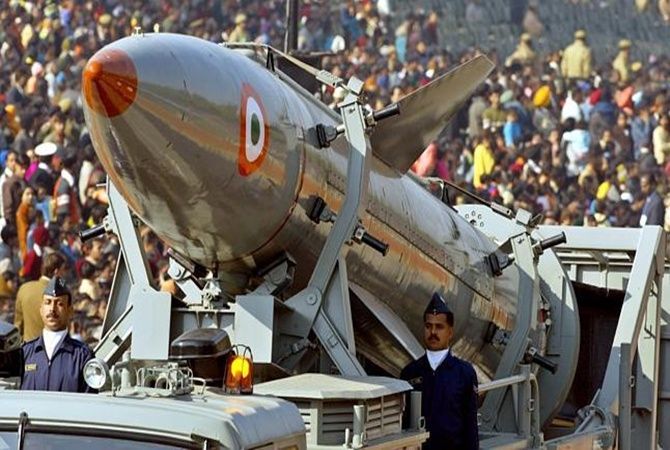 | « Back to article | Print this article |
The ministry of defence has set a goal of $26 billion, including export of $7 billion for the industry by 2025-26 through its Defence Production Policy 2018.

Despite a marginal 6 per cent rise in defence allocation for FY21, domestic companies - Jindal Defence and L&T Defence - are actively looking at participating in the defence growth story, currently dominated by imports.
Recently, Larsen & Toubro (L&T) and Europe-based MBDA, a world leader in missile systems, formed a joint venture (JV) to set up a missile integration facility in Tamil Nadu.
Delhi-based Jindal Defence, part of O P Jindal Group, also announced its foray into small arms manufacturing in India via a JV with Taurus Armas S A, of Brazil.
“At present, foreign players supply almost 50 per cent of the total requirement of India’s defence equipment.
"The small arms market in India is estimated to be $10-12 billion by 2035.
"This gives enough opportunity for domestic firms like us (Jindal Defence) to venture into defence manufacturing,” Abhyuday Jindal, promoter of Jindal Defence told Business Standard.
The ministry of defence has set a goal of $26 billion, including export of $7 billion for the industry by 2025-26 through its Defence Production Policy 2018.
“Due to this, the cumulative anticipated capex spend for domestic industry over the next six years would be about Rs 10 trillion.
"With Make in India initiative kicking in, the indigenisation in defence sector should go up from the 35-40 per cent to 70-75 per cent.
"So, there is ample scope for domestic players,” said J D Patil, director and senior executive vice-president (defence &smart technologies) at L&T (defence business).
L&T’s JV will build complete missile systems for the armed forces, exploring prospects under the Buy {Indian - IDDM (Indigenously Designed, Developed and Manufactured)}, Buy (Indian), and Buy & Make (Indian) categories for defence procurement.
Meanwhile, new entrant Jindal Defence plans an initial investment of $5 million for its small arms unit in Hisar.
The company aims at a private investment in the initial stage and will explore funding opportunities later.
Jindal wants to position itself as an import substitution in the long term.
“Our major competition will be imports from global firearms manufacturers.
"There are a few other Indian private companies in this (small arms) space.
"However, they lack significant capacities to meet the demand. Our focus will be import substitution,” said Jindal.
India ranks among the world’s top five countries, with the highest expenditure in defence sector, said experts.
“The sector has a healthy mid- to long-term potential to be a major contributor to ‘Make in India’ and modernising of armed forces through indigenisation.
"Given long-term strategic independence, the government has little choice but to refocus and promote building indigenous platforms right from the development of technologies and concepts,” said Patil.
Though India has a long way to go in terms of being self-reliant in the defence segment, there is certainly an ample scope and potential in-house.
“The decision-making pace is picking up for large programmes, especially, under strategic partnership category.
"While these are big positives this year, the defence capital budget, which saw a nominal increase, has disappointed the industry.
"However, the solace has been found in the statement that national security should remain country’s core priority,” said Patil.
The strategic partnership model is aimed at reducing India’s dependence on defence imports and helps private companies to gain an entry into defence procurement.
Photograph: Reuters